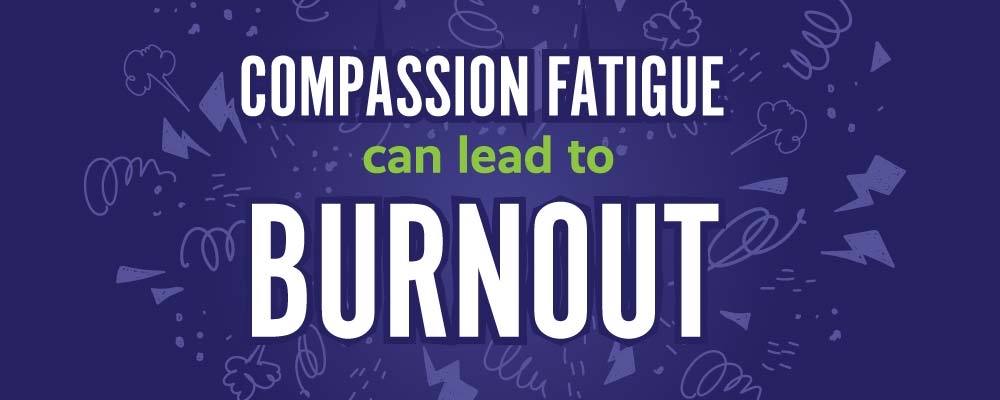Professions that require acts of human services require a remarkable amount of effort and commitment on behalf of the employee. Becoming a nurse requires the intrinsic motivation to improve other people’s quality of life; the primary aspect is their health. They are constantly monitoring patients by analyzing their health data and engaging in conversations where they address patient health concerns. Caring for patients will always be the top priority for nurses, but it comes at the expense of their own health.

According to Kronos Incorporated, 93% of nurses are physically and/or mentally exhausted by the end of the day. With the healthcare industry going mobile, often times, healthcare providers find themselves working outside their typical job hours to help their patients. With the constant physical, mental, and emotional demands, nurses develop symptoms of compassion fatigue, which can quickly lead to burnout without proper care. Navigating through the stress is possible, and we have explored different forms of self-care nurses can exercise when they feel compassion fatigue or burnout.
Compassion Fatigue can Lead to Burnout
Compassion fatigue (CF) is a product of physical/mental exhaustion and constant exposure to traumatic events. Some symptoms include:
- Reduced ability to empathize or sympathize
- Hypersensitivity towards events that lead to emotional outbursts
- Dread and anxiety when working with patients
- Inability to sleep, constant stress dreams
- Changes in belief and work values
Experiencing these symptoms is normal, but many nurses find themselves overwhelmed with guilt for harboring these emotions. Internalizing these feelings will lead to what’s commonly known as burnout – the complete eradication of passion for one’s profession. The symptoms for burnout are more severe as it includes:
- Cynicism for work-related activities
- Detachment from work and productivity
- Constantly angry, irritable, and critical
- Alienation from any social activity
- May be depressed, anxious, or suicidal
Overlapping factors that lead to CF and burnout are: work overload, unsupportive relationships between supervisor and peers, and time pressures to accomplish difficult tasks. The noticeable difference between the two relates to the personal motivation to continue working. It’s believed that reaching burnout is the point of no return, so it is important to address the stress when we are at CF in order to “reset” ourselves, once again feeling the joys of being a caregiver.
How to Treat Compassion Fatigue and Prevent Burnout
Recognizing the symptoms of CF early-on can be a jarring experience that causes guilt and self-doubt among professions that focus on helping others. It is valid to feel frustrated, tired, or anxious about a job that has high stress-levels. Rather than letting it diminish your passion or ability to perform, there are ways to overcome CF that can help make the work day more bearable.
Corporations are shifting company culture and prioritizing employee satisfaction, therefore including counseling or therapy in their healthcare benefits. Seeking help from a licensed professional provides people guidance as they process their emotions and find healthy coping mechanisms for their stress. If therapy is not for you, here are some lifestyle changes you can implement to manage CF:
Find a Hobby That Sparks Joy
Frustration at work can be a product of our inability to dictate what work we actually want to do. Utilizing days off to do something that makes you genuinely happy can greatly improve quality of life because we regain control over ourselves. Engaging in stress-relieving activities is up to your discretion – as long as it’s healthy for you, pursue it!
Nurture Relationships Outside of Work
It’s great to be on good standing with coworkers, but interacting with people outside of your profession takes your mind off of the problems you may have with your work. Of course having a circle of people who you can confide in is important, and establishing meaningful connections that go beyond emotional relief is even better.
Keep a Gratitude Journal
Writing out your thoughts is a healthy way to relieve tension, so why not take it a step further and think of note-worthy events that occured in the workplace that you are thankful for. Daily or weekly journaling helps preserve our passion and reminds us of the positive aspects of our job.
Cut Down on the Caffeine
There are studies that link caffeine to increased levels in anxiety and fatigue. Though you may feel more energized after a cup of Joe, the long-term outcomes of consuming caffeine daily severely outweigh the short-term benefits. Following a strict sleeping schedule that gives you time for rest ensures that you have enough energy for the beginning of the shift. Snack on healthier alternatives throughout, like nuts and berries, that are loaded in protein, carbohydrates, vitamins, and/or electrolytes to give you an extra energy boost.
Listen to Your Body, Take Breaks
Take 5 minute breaks if you display physical signs of exhaustion like eye irritation or a headache. Rather than going on your phone to catch up on social media, use this time to rest your eyes and mind. Practice breathing exercises or meditation to give your body a chance to relax.
Experiencing compassion fatigue or burnout is normal, and can be managed when identified. Eisenhower Health cares for our nurses; join our nursing team and visit our Career page for current job openings.
Originally posted on 2/29/2020



